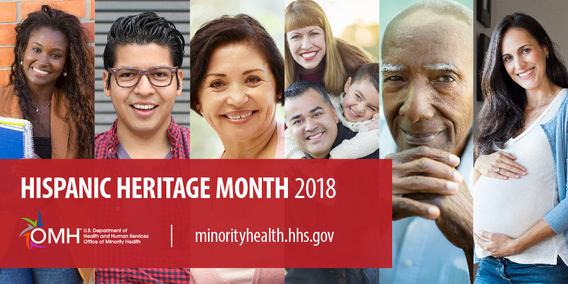 Hispanic Heritage Month (HHM)
takes place every year from September 15 to October 15. HHM is a time to
celebrate the histories, cultures and contributions of the Latino community in
the U.S., raise awareness about Hispanic/Latino health gaps, and provide a
platform for national Hispanic/Latino health organizations to discuss the
challenges and opportunities in helping end health disparities.
This year, the HHS Office of Minority Health (OMH) its focusing its
efforts on building awareness about health disparities in the Hispanic/Latino
community and highlighting the importance of Hispanic/Latino community
participation in research studies to help scientists
and medical professionals better treat diseases. Visit the Hispanic Heritage
Month observance page for more information, resources and events occurring during
the observance period.
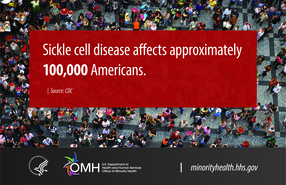 Sickle cell disease (SCD) is a group of inherited red
blood disorders. SCD affects millions globally and disproportionately impacts
certain racial and ethnic populations including African Americans, Latinos and
people of Middle Eastern, Indian, Asian and Mediterranean descent. According to
the Centers
for Disease Control and Prevention (CDC), it is estimated that
SCD affects approximately 100,000 individuals in the U.S.
The U.S. Department of Health and Human Services (HHS) is
committed to reducing the burden of this disease. HHS is continuing to focus its
efforts on helping to raise awareness about the importance of sickle cell
disease research and treatment. Federal, state, local, tribal and territorial partners, people
living with SCD, and family and caregivers are encouraged to visit the National Sickle Cell
Awareness Month website to watch the Sickle Cell Stories videos,
featuring a conversation with Assistant Secretary for Health ADM Brett P.
Giroir and Surgeon General VADM Jerome M. Adams about HHS efforts to address
SCD and the stories of people living with SCD, family members and advocates.
|
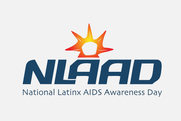 National Latino AIDS Awareness Day (NLAAD) is observed
every year on October 15. The purpose of NLAAD is to increase awareness about the
impact of HIV/AIDS on the Hispanic/Latino population in the United States.
HIV/AIDS disproportionately effects Hispanic/Latino communities. According to
the Centers
for Disease Control and Prevention (CDC), in 2015, Hispanics/Latinos
accounted for about one quarter of all new diagnoses of HIV in the United
States, despite representing about 18% of the total US population.
This year, the theme for NLAAD is “Ending HIV is
everyone’s job”, which calls for federal, state, and local organizations to
partner up to reach Latino/Hispanic communities, promote HIV testing, and
provide HIV prevention information and access to care. For more information,
social media toolkits, and awareness day events, visit the National Latino AIDS
Awareness Day (NLAAD) website.
|
 Health Literacy
month recognizes the importance for everyone to be able to receive,
communicate, and understand basic health information and services to make the
best health decisions. During this observance, health care professionals are encouraged
to share and explain health information to patients and caregivers, as well as
assist them in finding health related information and services. Learn more
about what organizations, communities, and individuals can do to help improve
health literacy by visiting the Centers for Disease
Control and Prevention website.
|
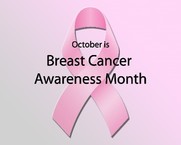 October is Breast Cancer Awareness Month, a time to
increase awareness of the disease as well as its cause, prevention,
diagnosis, treatment and cure. According to the National
Cancer Institute (NCI) at the National Institutes of Health (NIH), breast
cancer is the second most common cancer in women. Some women are at higher risk
of breast cancer than others based on their family or personal history.
This year, the Office of Minority Health encourages regular
screenings and check-ups with primary care medical personnel. An early
diagnosis can help lead to successful treatments. For more information about breast
cancer, treatment options available, clinical trials and research, please
visit NCI's Breast Cancer
website.
|
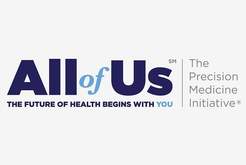 The
National Institutes of Health’s All of Us Research Program is a historic effort
to gather data from one million or more people
living in the U.S. to accelerate research and improve health. The mission of
the All of Us Research Program is to speed up health breakthroughs by
collecting health information from one million participants. The information
collected will be used for future health studies to improve health. Visit
the All
of Us Research Program website to learn more about the valiant efforts of NIH research
and how you can participate.
|
 October is
National Medical Librarians Month. The
Knowledge Center online catalog features library-sponsored programs aimed at
reducing health disparities and improving health literacy for vulnerable
populations. Search here to see
recent program descriptions or request additional information.
In recognition of National
Health Literacy Month, the Knowledge Center is highlighting
library-sponsored programs aimed at reducing health disparities and improving
health literacy for vulnerable populations. Search here to see recent program
descriptions or request additional information.
|
|